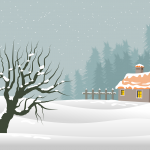Oh! My home
When shall I see my home?
When shall I see my native land?
I will never forget my home!
I could remember when we, the leaders of tomorrow, in our dusty rubber sandals disturbed the earth with our foot march as we sang at the top of our voices – birds perched on the trees lining the sides of our assembly ground to watch us. We believed in the soil we marched on and our voices were like thunder because we were enthusiastic. Even in our wretchedness of mud buildings and thatched roofs, with our clay pots’ content giving us the absolute refreshment we needed after getting roasted by the sun, even with the rushing excitement to peep through the door of papa Onyi to watch TV because we had none at home, we would never exchange those for any luxury. We loved home. Home was where our hearts lived. Our hearts were filled with hopes; hopes that we were the future; hopes that we would sustain our culture.
I remember one day when Onyi’s uncle who lived in the city came to take him along with him. Onyi ran out of the house to the bush. He didn’t want to leave behind all that he was, he didn’t want to leave all the memories shared, and he didn’t want to leave home. He was only ten, the big brother to us children in the compound. His father had to beg him and made different promises to him before he finally agreed.
“Will I come back soon?” He asked.
His father affirmed, but the ‘soon’ was eight years later.
We all cried when he left. We were each other’s keepers in the hood.
We didn’t like formal education. We didn’t like that we had to wake early, wash our faces and legs, and walk the long distance to school. We didn’t like that we have to sit quietly in class and listen to a teacher mixing words and letters we don’t know. We didn’t like that Uncle Haruna the maths teacher always wore that aggressive look that seemed like someone was living his life. He always held a cane longer than any of us. Before the end of each maths class, most pupils would be crying from uncle Haruna’s cane’s touch. He made us hate maths and I remember hating maths even as I grew.
We preferred to sit around Uncle Nna (our paternal uncle) after dinner while he told stories of the wise tortoise, the animal kingdom, and spiritual beings. He told us stories of cultures, traditions, superheroes, human existence, and we sang along. Afterwards, we went to bed with smiles and moral lessons. We didn’t care that we had to sit on the ground for our mother to comb our kinky hair. We didn’t care that we played in the rain or that at twelve, we still played with sand. After each day’s waka, we all found our way home. Home gave us peace, made us carefree, and gave us happiness, freedom, and protection while we worried not.
As we grew up, one by one, we began leaving home for different adventures. We had a taste of something different, something that didn’t have the sourness of our native udara. It was an apple, and we loved it. We preferred it. Like the forbidden fruit, our eyes opened. Our kinky hair didn’t fit anymore. Our homes became local, outdated, and hard upon our skin. I remember the last time I met with Simi after years of being away, she said, “Amarachi, I’m tired of this place. It is just boring. If I have a chance to leave, I don’t want to return.”
Of course, we are chasing after shadows that we might never catch up with. No matter how hard we try, we left a part of ourselves somewhere at that place we once called home. This is to say, our hearts only know peace and is at home when we think of home or when we smell the earth there. This is to say, just like a soldier on a battlefield, we long to go home someday.
Read – A New Home – A Children’s Story by Moses Tololo, Zambia
——-
The Writers Space Africa(WSA) Magazine is published by a team of professionals and downloadable for free. If you would like to support our work, please buy us coffee – https://www.buymeacoffee.com/wsamagazine








Thank you WSA
Great piece